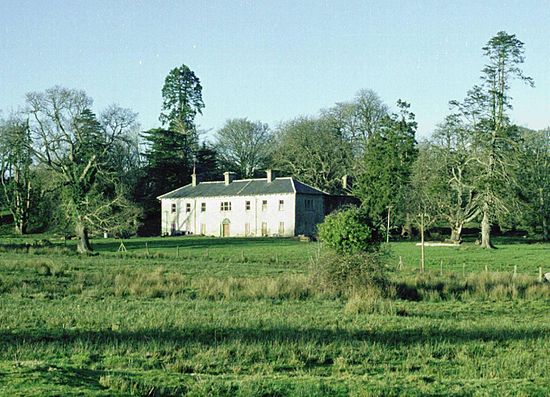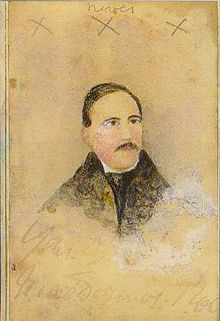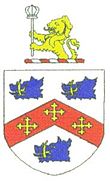- MacDermot Roe
-
MacDermot Roe (MacDiarmata Ruadh) is the name of a sept of the MacDermot Kings of Moylurg.
Tracing their origin to 1266, the MacDermots Roe (MacDiarmata Ruadh) of Ireland served as Biatachs General of the Kingdom of Connacht and were the principal patrons of the Irish composer Turlough Carolan, 1670-1738. The MacDermots Roe exemplify the role played by a leading Irish family under the old Gaelic order and its fate after the consolidation of English rule in the early 17th century.
 MacDermot Roe Coat of Arms
MacDermot Roe Coat of Arms
Contents
Origins
The MacDermots Roe descend from Dermot Roe (the appellation Roe or Ruadh meaning red in Irish), grandson of Cormac MacDermot, King of Moylurg, 1218-1244.[1] Moylurg was an ancient kingdom in what is now northern County Roscommon, Ireland and lay within the Kingdom of Connacht which included the modern counties of Galway, Leitrim, Mayo, Roscommon and Sligo.[2]
In 1266, Dermot Roe MacDermot, the grandson of Cormac MacDermot, King of Moylurg, was blinded by the Aedh mac Felim Ua Conchobair, King of Connacht.[3] Thereafter, Dermot was known as Dermot Dall (Dall meaning blind in Irish). Dermot Dall had a grandson, Dermot Roe whose descendants adopted the surname Mac (son of) Dermot Roe to distinguish themselves from other members of the MacDermot family.[4]
Biatach General
Cormac MacDermot Roe, who was killed in battle in 1365, was the Biatach General of Connacht.[5] As Biatach General, Cormac was responsible for the welfare of the poor and homeless and for the provision of food and shelter to travelers throughout Connacht.[6]
Some sources state that the position of Biatach included responsibility for providing victuals to the chief’s soldiers. [7] Thus, MacDermot Roe’s responsibilities as Biatach General may have been comparable to a modern Quartermaster General, as well as, head of social welfare services.[8]
Positions of this nature in Ireland were passed down within a given family. For example, the head of the MacDermot family was the hereditary Marshal of Connacht.[9] Such was the case with the MacDermots Roe and the office of Biatach General of Connacht.[10]
In addition to their charitable duties as Biatachs General, the MacDermots Roe were church leaders serving as bishops, abbots and priors. Additionally, in 1385, the MacDermots Roe established the Dominican Priory of the Holy Cross at Cloonshanville, near modern day Frenchpark in County Roscommon.[11]
Expansion of the MacDermots Roe
In 1455 and again 1471, the MacDermots Roe are described as Lords of Coilte Conchoghair, a small territory between the Feorish and Arigna Rivers, now the northern portion of Kilronan Parish, County Roscommon. By the 16th century, the MacDermots Roe, apparently displacing the MacManus family, controlled all Kilronan including valuable iron mines and iron works around Arigna.[12]
While the family eventually spread, not only, throughout Moylurg, but also, further south in County Roscommon[13], their headquarters remained in Kilronan at Alderford, formerly Camagh, near Ballyfarnon. [14] By the end of the Gaelic period, the MacDermots Roe accounted for about one third of the MacDermot Clan.[15]
The MacDermots were vigorous supporters of Ireland’s Nine Years War against England and were conspicuous in the Irish victory at the Battle of Curlew Pass in 1599. [16] However, the MacDermots Roe were more cautious. In a report dated September 1597, Sir Conyers Clifford, English President of Connacht, wrote that the MacDermots Roe had come to him and were living about Boyle Abbey. [17]
English Colonial Period
In 1607 Conor MacDermot Roe, a cousin of Ferghal, the last MacDermot Roe chieftain elected under the Gaelic brehon legal system, surrendered MacDermot Roe lands in Kilronan to King James I and received them back in fee simple as a grant from the King. In the grant, Conor is referred to merely as a “representative” of the family.[18]
The 1607 surrender and re-grant to Conor MacDermotRoe was illustrative of the eclipse of the Gaelic order. The English abolished the lrish brehon legal system and along with it the Irish system of clan land ownership and the Irish practice of electing clan chiefs. Henceforth, the chief’s property and his title passed to the eldest son under primogeniture.[19]
The MacDermots Roe were Jacobites, supporting James II against William of Orange following the 1688 English Revolution. Sir Terence Dermott served as Lord Mayor of Dublin in 1689 under James II.[20] Later, Sir Terence followed James II into exile at Saint-Germain-en-Laye, France where the King made him a captain of a privateer vessel.[21] Henry MacDermot Roe was a Jacobite captain in the army of James II.[22]
Despite their support for the Stuarts, the MacDermots Roe of Alderford continued to have substantial landholdings in Kilronan while remaining Catholic.[23] However, following the death of Charles MacDermot Roe in 1759, Charles’ brother John, who had become a Protestant, evicted Charles’ family from Alderford.[24]
John’s descendants became officials of the Anglo-Irish government. Thomas Charles MacDermot Roe was High Sheriff of County Roscommon and Justice of the Peace in Counties Roscommon and Sligo in 1875.[25] His line went extinct in 1917.[26]
Patrons of Carolan
The MacDermots Roe were the principle patrons of the Irish composer Turlough Carolan. Carolan is often referred to as the last of the great bards and is considered by many to be Ireland’s national composer.[27]
The MacDermots Roe patronage of Carolan was particularly significant since it came at a time when Gaelic culture was vigorously suppressed by English measures such as the Penal Laws.[28] Since ancient times, Irish bards played an important cultural role preserving Irish myths, histories and genealogies in the oral tradition. Bards served as officials of kings and chiefs and, like Carolan, they traveled the kingdom composing songs for notables.[29]
Coat of Arms
The coat of arms of the MacDermot Roe of Alderford was:
- Dark Blue: 3 boars’ heads
- Gold: Crosses, circles, boars’ tusks and bristles
- Red: Band or chevron, boars’ tongues
- White: Main part of shield[30]
While the motto of the MacDermot Roe of Alderford was “Honor Probataque Virtus”, an American branch of the MacDermots Roe has published the motto “Justice and Charity” reflecting the family’s Biatach tradition.[31]
The MacDermots Roe Today
After the 17th century, the use of the appellation Roe went into steep decline and the Roe was generally dropped outside County Roscommon. While a substantial portion of the thousands of MacDermots living today descend from the MacDermots Roe, only a handful in Ireland, the United States and Australia have retained the appellation in their name.[32] One branch of the family who emigrated to the United States in the late 19th century dropped the MacDermot and the family become known as Roe.[33] To the extent the name has survived in modern times, it is expressed as one word:
- McDermottroe
- MacDermott-Roe
- MacDermotRoe
- McDermott-Roe
Notable MacDermots Roe
Manus MacDermot Roe
In 1380, Manus was the Abbot of the Premonstratensian (reformed Augustinian) monastery on Trinity Island in Loch Ce in northern Roscommon.[34]
Bernard MacDermot Roe
Bernard was Prior of the Dominican Priory at Cloonshanville in 1698 when he was forced into exile.[35]
Ambrose MacDermot Roe
In April 1707, King James II of England, in exile at Saint-Germain-en-Laye, France recommended Ambrose as Bishop of Elphin to Pope Clement XI.[36] Ambrose, who served as Bishop 1708-1717 during the Penal Laws, reported in 1714 that he had ordained 32 priests in his Diocese.[37]
Thomas MacDermot Roe
Thomas, the third son of Carolan’s patrons, was Bishop of Ardagh, 1747-1751.[38]
Laurence Dermott
Laurence, 1720-1791, was the principal organizer and long time Grand Secretary of the Grand Lodge of England known as the Antients. The Antients founded some 200 masonic lodges in London, the provinces and overseas.[39] In 1756, Laurence published the freemasonry treatise Ahiman Rezon.[40]
Owen MacDermot
Owen was the secretary of the Dublin Society of United Irishmen.[41] The United Irishmen, a nationalist group led by Wolfe Tone, sparked the unsuccessful Irish rebellion of 1798.[42]
Thomas MacDermot
Brother of Owen, Thomas, born circa 1751, was Colonel of the Athleague Rangers, a Roscommon militia organization. During the French Revolution, Thomas joined Lord Edward Fitzgerald and other Irish nationalists in Paris to enlist French support for Irish resistance to English rule.[43]
Cornelius MacDermot Roe
Cornelius was George Washington’s mason at Mount Vernon from 1784 to 1788.[44] After leaving Washington’s service, Cornelius was hired to lay the foundation for one wing of the United States Capitol but did not complete the project due to a contract dispute.[45]
References
- ^ MacDermot Roe pedigree, Genealogical Office Manuscript 169, pp. 393-404 (956 A.D. - 1865), National Library of Ireland, Dublin
- ^ Connacht, http://en.wikipedia.org/wiki/Connacht, accessed April 12, 2010
- ^ Annals of the Four Masters, Electronic Text Edition, M1365.6 CELT, http://www.ucc.ie/celt/published/T100005C/ at M1266.10, accessed April 12, 2010 and Annals of Loch Ce, Wm. M. Hennessy, ed., Longman & Co., 1871, Volume I, p. 453.
- ^ MacDermot of Moylurg, p. 295
- ^ Annals of the Four Masters, Electronic Text Edition, M1365.6, http://www.ucc.ie/celt/online/T100005C.html accessed April 12, 2010
- ^ Mattimoe, Cyril, North Roscommon, Its People and Past, 1992, p. 74
- ^ Old Irish Lexicon, University College Cork, http://epu.ucc.ie/lexicon/B?n=1812&file=B, accessed April 17, 2010; Joyce, P.W., A Smaller Social History of Ireland, Chapter XVII, Section 10, http://www.libraryireland.com/SocialHistoryAncientIreland/III-XVII-10.php accessed April 12, 2010
- ^ Biatach, also, spelled biadhtach, is a gaelic word translated as farmer and provider MacBain, Alexander, An Etymological Dictionary of the Gaelic Language, 2nd ed. 1911, reprinted 1982.
- ^ MacDermot of Moylurg, p. 474
- ^ Letter from Cyril Mattimoe, author of Roscommon, Its People and Past to Kenneth MacDermotRoe dated February 2, 2000
- ^ Letter from Cyril Mattimoe, author of Roscommon, Its People and Past to Kenneth MacDermotRoe dated February 2, 2000
- ^ MacDermot of Moylurg, p. 295
- ^ In 1611 Cormac MacDermot Roe was in Athleague, County Roscommon, well south of Moylurg, as shown in the 14th report of the Keepers of the Record, apparently a list of persons affirming their loyalty to the English government.
- ^ O’Sullivan Donal, Carolan, The Life and Times and Music of an Irish Harper, 1958, Volume One, p. 46
- ^ MacDermot of Moylurg, pp. 460-463
- ^ North Roscommon, Its People and Past, pp. 196-202
- ^ Quoted in MacDermot of Moylurg, p. 172
- ^ MacDermot Roe pedigree GOMs 169 includes a copy of Conor MacDermot Roe’s 1607 grant
- ^ Curtis, Edmond, A History of Ireland, 1936, pp. 222-223: Foster, R.F., Modern Ireland, 1988, p. 65
- ^ It was common for members of the MacDermot clan, including MacDermots Roe, to abandon the “Mac” in the early 18th century only to resume it at the end of the century. Compare the MacDermot listings in the Elphin Census of 1749 to those listed in the Index to Griffith V aluations 1848-1864, CD #188, Heritage World & the Genealogical Publishing Co.
- ^ Calendar of Stuart Papers, Royal Commission on Historical Manuscripts, Volume 1, p. 213, http://books.google.com/books?id=5sYKAAAAYAAJ&printsec=frontcover&dq=Calendar+of+Stuart+Papers,+Royal+Commission+on+Historical+Manuscripts,+Francis+Daniel&source=bl&ots=VRQO22Zhr_&sig=TZKIWTogDOBi3h9etPkwG_W1yo8&hl=en&ei=mHnHS-DZKcT7lweVrszEAQ&sa=X&oi=book_result&ct=result&resnum=8&ved=0CBsQ6AEwBw#v=onepage&q&f=false, accessed April 15, 2010
- ^ MacDermot of Moylurg, p. 233
- ^ MacDermot of Moylurg, p. 296
- ^ Life of O'Carolan, Mundey-O'Reilly Manuscript, National Library of Ireland, Dublin, Mircrofiilm Positive #4132.
- ^ Burke’s Landed Gentry of Ireland, 1904, p. 368
- ^ MacDermot of Moylurg, p. 297.
- ^ Carolan, O’Sullivan is the authoritative work on the life of the composer.
- ^ Foster, Modern Ireland, pp. 154, 205-207, 211
- ^ MacManus, Seukmas, The Story of the Irish Race, 1921, republished 2005, pp. 179-186. See, also, Rutherford, Ward, Celtic Lore, The History of the Druids and Their Timeless Tradition, 1993, pp. 50, 132 for the connection between druids and bards.
- ^ O’Hart, John,Irish Pedigrees, P. Murphy & Son, New York, 1915, pp. 521-523; Burke’s General Armory of England, Scotland, Ireland and Wales, Harrison & Sons, London, 1884, p. 637
- ^ Ibid and see, also, article on MacDermot Roe heraldry at http://www.macdermotroe.com/
- ^ For example, out of thousands of North American MacDermots only four families have been identified that use the appellation Roe as part of their surname.
- ^ Pedigree of the MacDermots Roe of Cloughmine.http://www.macdermotroe.com/
- ^ MacDermot of Moylurg, pp. 204,209
- ^ Ibid, p. 622
- ^ Calendar of Stuart Papers, Royal Commission on Historical Manuscripts, Volume 1, p. 213
- ^ MacDermot of Moylurg, p. 298
- ^ McNamee, Bishop James J., History of the Diocese of Ardagh, pp. 393-395
- ^ H.L. Haywood, History of Freemasonry, Chapter XIV, The Great Division, http://www.themasonictrowel.com/books/history_of_freemasonry_by_h_l_haywood/history_of_freemasonry.htm, accessed April 14, 2010
- ^ Lepper, John and Crossle, Philip, History of the Grand Lodge of Free and Accepted Masons of Ireland, Dublin, 1925, Vol. 1, p. 236
- ^ The recollections of Skeffington Gibbon, from 1796 to the present year, 1829; being an epitome of the lives and characters of the nobility and gentry of Roscommon, 1829, p. 74
- ^ Modern Ireland, Foster, pp. 264-270, 279-280
- ^ Hayes, Richard, Biographical Dictionary of Irishmen in France, Dublin, 1949, pp. 175-176 and see Hayes’ Ireland and Irishmen in the French Revolution, London, 1932, pp. 101-103
- ^ Murphy, Nathan, AG, Cornelius MacDermot Roe: Indentured Servant to George Washington, National Genealogical Quarterly, Vol. 95, No.2, June 2007, pp. 135-137
- ^ Ibid, pp. 138-140
See also
External links
Categories:- Kings of Connacht
- The Connachta
- Royal families
- Medieval Gaels
- Surnames
- MacDermot family
Wikimedia Foundation. 2010.



